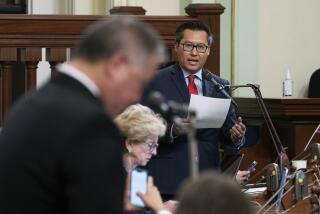Judge Opens Doors for Candidates in Recall Race
- Share via
A week before he will decide where the recall election against San Diego City Councilwoman Linda Bernhardt should be held, a Superior Court judge Wednesday agreed to allow potential candidates to circulate nominating petitions, regardless of whether they live in Bernhardt’s new or old district.
In a ruling similar to one that he issued last week, Judge Harrison Hollywood said that, because of the uncertainty over the recall’s boundaries, fairness dictated that candidates living either in Bernhardt’s new or old 5th District should be permitted to take preliminary steps toward competing in the April 9 election.
At a hearing scheduled for Feb. 6, Hollywood plans to decide whether to uphold the City Council’s controversial decision to hold the recall in Bernhardt’s new district rather than the one that elected her in 1989.
That decision, in turn, will determine whether several of Bernhardt’s would-be successors affected by Wednesday’s ruling will compete in the spring election or prove merely to be, as one lawyer in the case wryly put it, “candidates for a week.”
Unless Hollywood reverses the council and orders the recall to be held in Bernhardt’s former district, the candidates given clearance Wednesday to circulate petitions will be ineligible to compete in San Diego’s first council recall campaign since the City Charter was approved early this century.
Hollywood’s ruling Wednesday came in a closed hearing on a lawsuit filed by Tom Behr, a corporate lawyer from Scripps Ranch who, because he lives within the 5th District’s former boundaries, found his candidacy derailed by the council’s decision earlier this month.
In the lawsuit, Behr contended that the council’s decision improperly disenfranchised the voters who elected Bernhardt by taking away their right to recall her.
Arguing that the council lacked the authority to decide where to hold the recall, Behr added that, even if the council had that power, Bernhardt’s participation in the 5-4 decision--made with her casting the decisive ballot--represented a conflict of interest.
Although deferring his decision on those questions, Hollywood instructed the city clerk’s office to allow Behr and other potential candidates who live in Bernhardt’s old district to circulate petitions in the meantime.
“This was the fairest thing to all candidates,” Behr said. “There’s some uncertainty . . . but I’m going ahead on the basis of expecting to win (in court) next week.”
Another candidate, county planner Mike Eckmann of Scripps Ranch, said after Wednesday’s hearing that he, too, plans to gather signatures on his nominating petitions in anticipation of a favorable ruling next week. Other potential candidates affected by Wednesday’s decision include former Councilman Ed Struiksma, the two-term incumbent whom Bernhardt upset, and Lucy Gonzales.
Wednesday’s decision will not directly influence another possible candidate, former Councilman Floyd Morrow, whose Kearny Mesa home falls within both the 5th District’s old boundaries and the new ones created when the council redrew district lines last year. Therefore, Morrow will be eligible to run regardless of how Hollywood rules.
In a related hearing next week, Hollywood also will decide whether to extend a residency requirement that poses an obstacle to the candidacy of Robert Schuman, a stockbroker and former San Diego County Republican Party chairman.
Anticipating that the recall would be held in the former 5th District, Schuman had moved from Bay Park in the new district to Mira Mesa in the old one. When the council did the opposite of what he expected, he quickly moved back to Bay Park--but one day too late to satisfy a requirement that candidates must live within a district 30 days before the filing deadline.
The April recall actually consists of two tandem campaigns: an up-or-down election in which a simple majority vote will determine Bernhardt’s political fate, and a separate race on potential successors.
If Bernhardt receives more than 50% of the vote, she will retain her post, rendering the outcome of the companion election on possible successors moot. However, if Bernhardt is ousted, the candidate drawing the most votes in the other race--in which Bernhardt cannot compete--would serve the rest of her four-year term, which expires in December, 1993.
More to Read
Sign up for Essential California
The most important California stories and recommendations in your inbox every morning.
You may occasionally receive promotional content from the Los Angeles Times.










